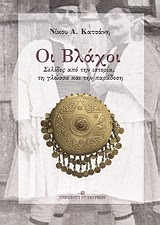~ Για ελληνικά:
In our previous notes we talked about the views of linguists, historians and journalists about language, history and tradition of Vlachs/Armanians. We derived these views directly from bibliography and we emphasized that we will expose the views of everyone. We believe that no one, as individual or as an accosiation (group) do not have a MONOPOLY on the management of the Armanian/Vlachic language or dialect or whatever.
However, we believe that institutions like ‘ Panellenic Federation of Vlach Cultural Associations of Armanians/Vlachs’ are more responsible than any individual or any group at a level, not scientific, but cultural and political (we might say), to express the resultant opinion of the views (on the subject) of all associations of Vlachs/Armanians in Greece.
It only remains for the whole scientific community to express its opinion in serious symposiums/forums and not only in individual scientific statements, so that the issue will be clarified thoroughly.
Mr. Katsanis (scientist) in his book "The Vlachs, pages from the history, language and tradition'', publications ‘UNIVERSITY STUDIO PRESS’, Thessalonica 2010",among others states:
Let's try the background in history to restore some truths that afflicted Vlachs/Armanians since the mid -19th century
At the end of 3rd B.C. century, in the Balkans, there were future events that would play a decisive role in the future for Greeks and the formation of the Balkan languages. In the wars against the Illyrians, the Romans found the cause for their intervention in the Balkans and the materialization of their conquest plans.
From the very beginning of the presence of the Roman troops in the Balkan Peninsula, the penetration of the Latin language begins in the Greek and Balkan area. In 146 BC Greece is submitted officially to the Romans and it is organized as a Roman province.
Years passed and the capital of the Roman Empire moved to Constantinople. The language of the army, government, courts and the imperial court was Latin, although the majority of people were Greek-speaking. The struggle between the two languages was unequal and the cultural superiority of the Greeks preserved their body language (Greek). The effect from the Latin to the Greek language was minimal and it was mainly related to vocabulary, while loss in speakers, such as the Vlachs/Armanians, who are enlatinized Greeks, was not significant.
The enlatinization found appropriate ‘ground’ to isolated and mountainous populations, who early associated their lives and occupations with the Roman administration and army, since they were subject to the Roman state, cooperated to it ,as carriers and feeders, detached from Greek education and civilization centers.
The use of Latin language in government and army dominated until early 6th century A.C. According to Ioannis Lydos (6th century), a Byzantine officer, the language of public officials and citizens, largely in parts of Greece, was Latin. Lydos states characteristically ' ‘καίπερ Έλληνας εκ του πλείονος όντας τη των Ιταλών φθέγγεσθαι φωνή και μάλιστα τους δημοσιεύοντας’ (Although most of the people are Greek origin, they use the Italian speech, especially the state people)
In 535 A.C., Justinianos was the first, who put forword that the subjects of the Empire had difficulties to understand the state laws of the State, that were written in Latin, so he decided to translate them into Greek. : ‘Ου του πατρώα φωνή (λατινική) τον νόμο συνεγράψαμε αλλά ταύτη τη κοινή τε και ελλάδι δια το πρόχειρον της ερμηνείας ώστε άπασι είναι αυτόν γνώριμον’ (We wrote the law not in fatherland language-Latin- , but in Greek language, so that law can be understood to everyone).
So it appears that the presence of Latin and Greek in the Balkan area is long and lasts around seven centuries and throughout this time we have crucial linguistic changes in these areas. The Greek and Latin managed to eliminate the two ancient languages, Illyrian and Thracian. Latin language dominates north and Greek south. Jirecek (Czechoslovak historian and politician) based on ancient inscriptions (Greek, Latin) and his research, made this distinction (north, south), so we call the line ‘Jirecek’, which is still accepted by the science of history and linguistics.
This line starts from Lissos of Albania, passes north of Lake Ohrid, continues to Skopje, Sofia and ends at the mouth of the Danube.
Things were this way until the invasion of the Slavic tribes in the Balkans, where Slavic idioms spread on the peninsula. After this fact, Latin language had the largest shrinkage. From the Latin speaking part rescued Dakoroumanian (now Romania) was saved, plus the site of the Dalmatian coast (Dalmatia) plus some linguistc islets throughout the Balkans, like and Vlachs Greece and Vlachs from other Balkan countries.
In particular, Latin language bequeathed four Balkan languages, which can safely be characterized distinct (independent) languages (Katsanis’ theory). These are Dakoroumanian (now Romanian), Koutsovlachic, Moglenitic and Istroroumanic.
By John Tsiamitros, teacher of traditional dances,
translation in English by John Tsiamitros, too.
translation in English by John Tsiamitros, too.


Δεν υπάρχουν σχόλια:
Δημοσίευση σχολίου
Η κόσμια κριτική και η ανταλλαγή απόψεων μεταξύ των σχολιαστών είναι σεβαστή. Σχόλια τα οποία υπεισέρχονται σε προσωπικά δεδομένα ή με υβριστικό περιεχόμενο να μην γίνονται. Τα σχόλια αποτελούν καθαρά προσωπικές απόψεις των συντακτών τους. Οι διαχειριστές δεν ευθύνονται σε καμία περίπτωση για τυχόν δημοσίευση υβριστικού ή παράνομου περιεχομένου στα σχόλια των αναρτήσεων.Τα σχόλια αυτά θα διαγράφονται με την πρώτη ευκαιρία.